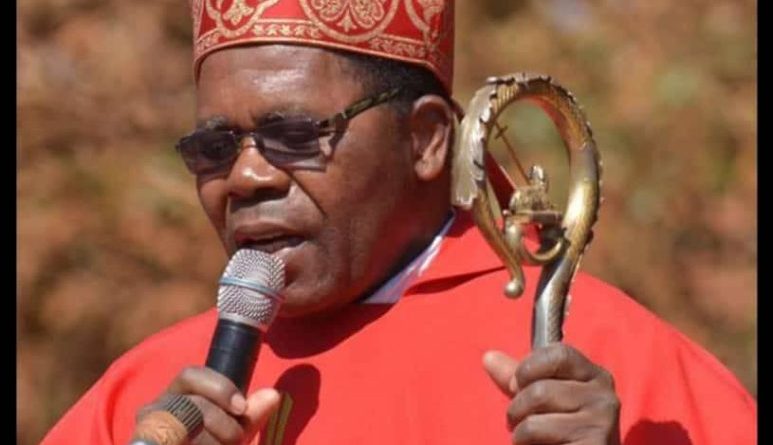The living memory of a moral authority: Tribute to Ambuye Tarcisius Ziyaye
It was Monday early morning, the 14 of December, 2020. As people from all walks of life were getting ready for the day’s schedules after Sunday interlude, news broke out. His Grace Archbishop Tarcisius Ziyaye of the Archdiocese of Lilongwe was no more. Earlier information has it that he had travelled to Namibia on a visit and while in that country he succumbed to a long-standing medical condition.
Within a space of time, the sad news went viral on almost all media outlets. Disbelief, utter shock and grief engulfed the entire Catholic community in the country and the sub-region, laity and clergy, and indeed women and men of good will across the divide. On Saturday, 19th of December, 2020, the late archbishop was laid down to rest right inside the Maula Cathedral consistent with the ancient tradition and the provisions of the Canon Law.
Indeed, Ambuye Ziyaye is gone once and for all. Although his journey is over and is never to return, his story lives on. A splendid and inspiring apostolic ministry spanning years of devotion, zeal and dedication has come to an end. Consecrated auxiliary bishop at a colorful ceremony at Bembeke in the Diocese of Dedza in 1992, Ambuye Ziyaye later on became the co-adjutor Bishop of Lilongwe when the late Bishop M. Chimole had suffered a stroke, and upon his retirement, was installed Bishop for the Diocese of Lilongwe. When the long serving Archbishop James Chiona of the Archdiocese of Blantyre went into retirement, Ambuye Ziyaye was assigned to take over as archbishop, the position he served for years until his transfer to the Archdiocese of Lilongwe following the retirement of Archbishop Ste Marie.

The apostolic ministry of Ambuye Ziyaye is so unique with twists and turns in many ways. Seen in light of scriptural examples, the picture turns to be typical of a life truly led by God. Dedicated to God, one is never in total control of oneself; there are always marks of divine surprises on the journey of life. The late archbishop is the only bishop in the history of the Catholic Church in Malawi to have moved through the ranks and file of vicar general, auxiliary bishop, co-adjutor bishop, bishop and archbishop.
Secondly, Ambuye Ziyaye remains the only bishop to have served in three different dioceses during his life having been auxiliary bishop of Dedza, co-adjutor and later bishop of Lilongwe, then Archbishop of Blantyre Archdiocese, and later transferred to the Archdiocese of Lilongwe. Again, he is the only one to have been appointed five times by the Vatican and taken over from three different ordinaries at different times in the recent history of the Church in the country. It is evident from all this that Ambuye Ziyaye not only was he the most senior serving archbishop in Malawi at the time of his death, but was also the only vastly experienced having served in several dioceses in addition to other positions he held in public and the Association of the Member Episcopal Conferences of Eastern and Central Africa (AMECEA).
Preaching on the eve of his interment on the 18th of December during the six o’clock Eucharistic Celebration, Fr Kaliu made highlights of so many lessons to be learnt from the life of the late archbishop. Of particular interest is what he referred to as the three Ds that Ambuye Ziyaye used to emphasize all along his apostolic ministry: Devotion, Doctrine and Discipline. To any kin observer, it is unmistakable that the life and ministry of the late archbishop was a true reflection of the man deeply committed to a life of prayer, adherence to the teachings of the Holy Catholic Church, and well-disciplined in every manner and respect in his self-conduct and interaction with those around, low or exalted in social standing.
Discipline is a moral virtue. It is characteristic of an orderly life both in thought and self-conduct. Others have gone further to propose a definition of discipline as knowing and doing what is right, at the right time, in the right manner and at the right place. Now looking at the life of Ambuye Ziyaye, it is very clear that his was a way of life built on and lived in expression of the moral virtue of discipline. It comes not as a surprise that those around him, clergy and laity alike, in many instances, felt deeply challenged by his high standards and quality of engagement.
From experience we know that it is not enough for those entrusted with positions both in state and society that they lead. Rather it is imperative for them that in doing so they inspire by the quality and moral standards of their leadership. This aspect speaks and lasts more than their words. Ambuye Ziyaye was an honest man and trustworthy servant of God and humanity. He truly meant what he said, and he said what he meant.
This is a rare quality amongst many leaders in this country, and this is particularly the case in the public-political space. For generations, politics, though quite a noble calling, has been distorted, thus increasingly becoming a harbinger of lies and falsehood to the extent that dishonesty and lies risk being synonymous to politics. Now as we mourn Ambuye Ziyaye, there are indeed great lessons for politicians in this country to unlearn the bad habits and transform into women and men consumed by honesty and truth.

Once upon a time confirming the high quality and moral integrity of the late archbishop, the Executive Director of the Public Affairs Committee confessed that during functions, Ambuye Ziyaye never accepted to receive and sign for any money he was not sure he deserved it. Such high moral integrity was inspirational to his co-workers and the lay faithful he was entrusted to lead. Whether in secular or religious spaces, effective leadership sets standards, and this is what the archbishop strived to do. This other day, the media was rife with stories about corruption in the public sector and even at the heart of the state house.
Well, repeated statements about the fight against corruption will yield nothing minus committed action in accordance to the law and demonstrated moral conviction. In the Catholic Tradition, matters of doctrine and morality are inseparable. Solid and sound doctrine remains the basis of enduring moral integrity. As alluded to by his Lordship, Bishop Mtumbuka, fighting against corruption and abuse of public office requires walking the talk.
Ambuye Ziyaye was also a man of courage and determination. This was the courage and determination borne out of his faith in Christ and God’s saving grace. Many times over he talked about the spirit and commitment to total self-giving to the will of God: “kudzipereka kwa toto moyo”. This used to be a frequent expression and trade mark during his homilies and counsels. Shortly after his consecration as auxiliary bishop of the diocese of Dedza, the late archbishop visited Zomba.
That was soon after the famous 1992 Bishops Pastoral Letter: Living Our Faith. This is the pastoral letter that ushered in the new political dispensation. Speaking in the Zomba Cathedral, he reflected on a question other people then were repeatedly asking him why he had submitted to the call to be bishop at the time when Church and state relations were at the lowest point ever and the lives of the bishops were at stake given the situation at the time. Ambuye Ziyaye indicated to the congregation that his answer was simple and straightforward: “I have accepted to be part of the college of the bishops in Malawi at the time when they are at their best!”
Surely this was not the answer of vain courage. Rather it was a response coming from the heart of a man who was passionate about social justice and was ready to play his part even if it meant suffering the consequences. These are marks of a true pastor and leadership. Ambuye Ziyaye was principled and uncompromising. We know those who have let down the ordinary men and women, the poor, in our communities, villages and towns are not only politicians and bureaucrats; even some men and women of the cloth have betrayed the people they are supposed to lean in justice and righteousness.
At various times and occasions, some members of the clergy have played roles that have sustained structures and systems of oppression in the country for private financial and material privileges. But, undoubtedly, politicians in this country would confess that they never found an ally in the late archbishop when it came to advancing causes detrimental to the interests and needs of the common women and men. He stood on principles and never wavered.

The late archbishop bishop was also a listening and patient man. In his address at his funeral, Archbishop Thomas Msusa described him as focused, action oriented, a unifier and passionate for the needs of the poor and the vulnerable. And on his part the Nuncio said the late archbishop cherished team work, dialogue and reconciliation. Indeed, many of those who happened to strike a conversation with the late archbishop would agree, he embodied all these qualities. While holding his position, he always expressed openness to alternative views. It is that quality that also made him a credible interlocutor. Ambuye Ziyaye also believed strongly in hard work and self-reliance both as a country and as a Church.
True dignity and freedom are possible only with a considerable degree of self-reliance in financial, material and even technical means and capabilities. A society that fails to be innovative in providing for itself the means for its sustenance cannot be considered free and dignified. Certainly, with time we are going to appreciate in various ways the gap that the late archbishop has left behind. The deterioration of the moral standards in this country, the wide spread culture of corruption and abuses of public office all this calls for moral sanity among leaders. Perhaps this is where Ambuye Ziyaye also remains a great inspiration to the present and future generations that it is possible to lead a life of moral integrity in the midst of moral decadence.



